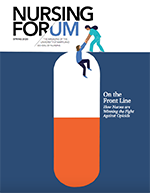Great Expectations: How to Support Families of Children with Life-Threatening Illnesses
July 17, 2020 Libby Zay
Through a qualitative interpretive study, Mooney-Doyle sought to better understand parental expectations of support from health care providers as they navigate their child’s illness and end of life.
OUR EXPERT: Kim Mooney-Doyle, PhD, RN, CPNP-AC, assistant professor
“Life-limiting illnesses in children can dramatically change what it means to be a parent,” says Kim Mooney-Doyle, PhD, RN, CPNP-AC, assistant professor, adding that living with, caring for, and eventually losing a child with such an illness is unimaginable for most families. Through a qualitative interpretive study funded by the National Institutes of Health’s National Institute of Nursing Research, Mooney-Doyle sought to better understand parental expectations of support from health care providers as they navigate their child’s illness and the end of their child’s life.
“Nurses can have such an impact,” says Mooney-Doyle, a pediatric oncology nurse. “They are there with the child and family over the course of their illness, working with them for 8-12 hours a day.” Yet in Mooney-Doyle’s study, parents often reported that they expected the health care team to be concerned about their emotional health, but they did not perceive that such a concern existed. To help explain what parents expect from health care providers, Mooney-Doyle and other researchers identified three themes that were published in the Journal of Pediatric Nursing.
- “HELP US SURVIVE THIS.”
Parents describe fears of not being able to complete basic tasks or of their family falling apart.
Parents want nurses to connect them to support that can help with their basic survival needs and balance the needs of the rest of their family, especially their other children, while they juggle illness-related demands.
Mooney-Doyle suggests nurses ask questions that go beyond the illness to other stressors that the family may face and connect parents to community resources and support.
“I didn’t know about the $3 discount parking, so I am paying up to $21 for parking every day, so I spent a lot. Everything that I had saved, I spent it all that first week here in the hospital. Then the second week I start meeting the social workers, they’re like, ‘Hey, I got a voucher!’ ” PARENT TESTIMONIAL - "LET'S FIGHT TOGETHER."
Parents describe a desire for health care providers to work with them (and not against them).
Parents want nurses to make them feel part of “the team” and provide care with love and recognition of the uniqueness of the child and family.
Mooney-Doyle suggests nurses understand what issues parents perceive as important and engage them in caretaking tasks (e.g., tube feeding, administering nebulizer treatments, adhering to a medicine regimen).
“Health care providers get so robotic, believing everybody is the same. My thing is everyone’s different. Don’t put me in no box. This is my daughter. I want the best for her. She is loved.” PARENT TESTIMONIAL
-
“GUIDE ME THROUGH THE DARKNESS.”
Parents describe feeling abandoned, desolate, empty, and alone.Parents want nurses to help them grapple with conflicting feelings about the competing demands of the rest of their family and the desire to come to terms with, or find peace in, their journey.
Mooney-Doyle suggests nurses invite parents to share their feelings of distress and suffering and share stories of other families – while protecting their privacy – to help parents normalize their situation.
“You come home and you’re mentally exhausted besides being physically exhausted. You want to give siblings your full attention and sometimes you just don’t have it – the fuel tank is empty. It’s definitely overwhelming, sometimes, only because you can’t do it all.” PARENT TESTIMONIAL
THIS ARTICLE FIRST APPEARED IN THE SPRING 2020 ISSUE OF NURSING FOR/UM MAGAZINE.
